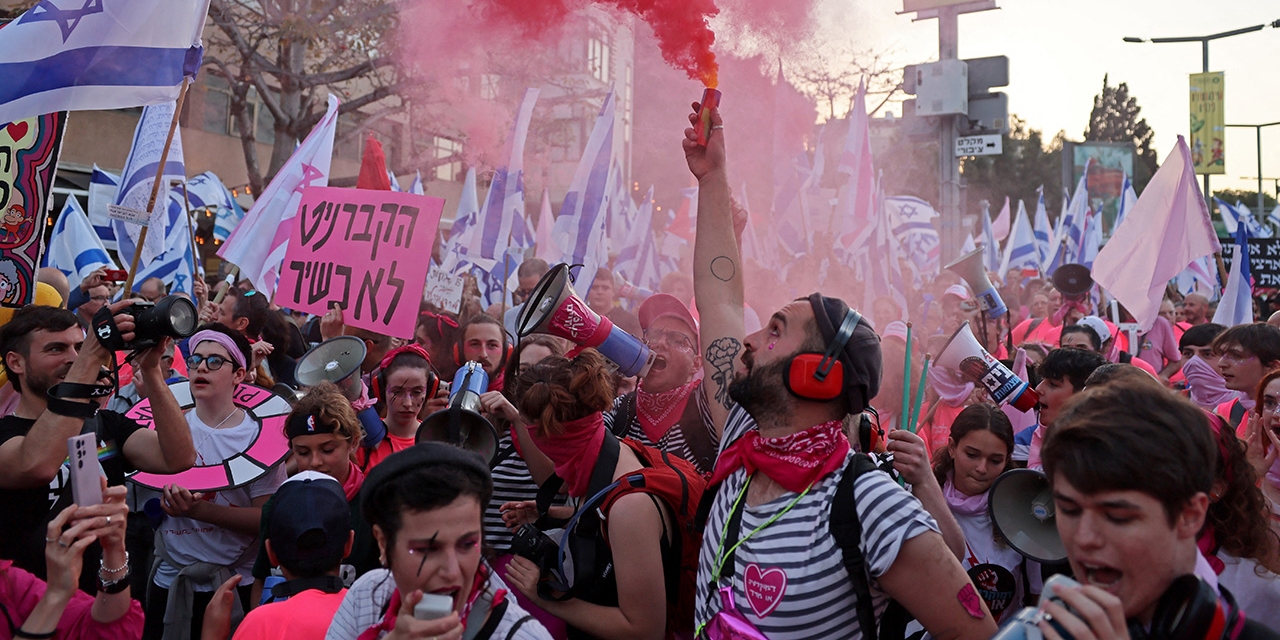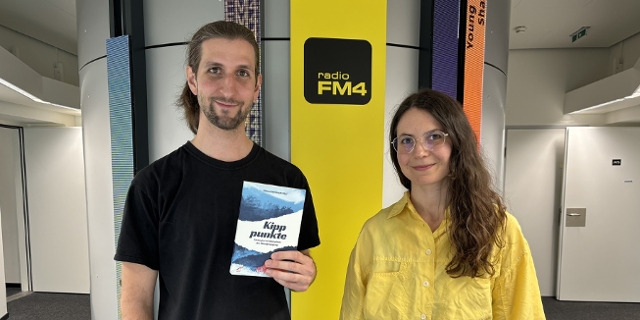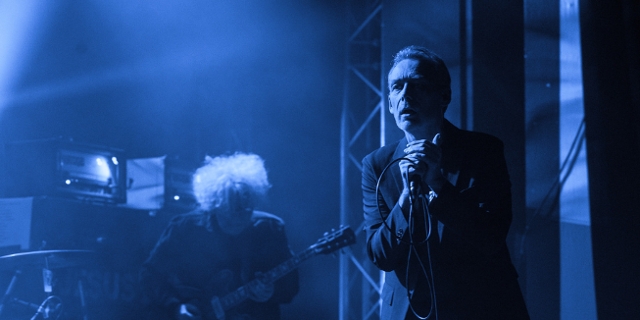„Israeli democracy is in existential danger“
The Jerusalem Post recently published an editorial saying “Israel’s democracy is in danger”. Senior commentators have spoken about a descent into “dictatorship.” These might seem like extreme statements, but these are extreme times in Israel, where the government has been described as extreme.
Take a look at the Security Minister, Itamar Ben-Gvir. He is a radical ultra-nationalist who has chanted „death to Arabs“ in the past. This is the man in charge of the nation’s police.
Such characters are in the government because the Prime Minister veteran political survivor Benjamin Netanyahu has had to cast his net ever wider to find parties to prop up his coalition. His traditional allies have shunned him over a corruption case. But his new government is facing weekly protests.
It is not the hardening attitudes to Palestinians that have brought tens of thousands of people to the streets, but a judicial reform that threatens to weaken the checks and balances on power.
Tom Segev is a prominent Israeli historian and journalists based in Jerusalem. He is in Vienna as part of the Vienna Jewish Film Festival which is examining 75 years of Israel. Tom told me that this is one of the perilous moments in all of those 75 years:
Tom Segev: Israeli democracy is in real danger. It’s in existential danger for the first time in the history of Israel. Never before did we have such ultra-right, racist, anti-democratic parties supporting a coalition. In fact, the coalition of Netanyahu is dependent on these parties. They are advancing a plan which they call “judicial reform”. In fact, I would say it is a putsch. And 200,000 people are going out on the street every weekend because they fear for democracy. So, this is a real, real danger.
Chris Cummins: How do you explain how we’ve got to this point?
Tom Segev: It’s the problem of every democracy that at certain times it is dependent on small partners. And in this case, the partners are very right wing. The other right-wing parties who could support Netanyahu don’t because he is still on trial for corruption and bribery.
CC: It is quite a price then for Netanyahu to pay reputationally. If you make alliances with people who have been convicted for incitement to hatred, for example, then that’s going to be written large in his political legacy. Is he desperate just to stay in power?
Tom Segev: He is desperate. And I think that protest coming from abroad is vital for our democracy because Netanyahu is very sensitive to pressure from abroad. In fact, if one democracy falls apart, it’s something which every other democracy should be very worried about.
CC: Can I ask you about Itamar Ben-Gvir, the security minister? He’s the one creating a lot of headlines. Please describe what sort of a man this is and how worried the world should be about him.
Tom Segev: The world should be very, very worried about him. He started out as a young hooligan among the settlers. He was involved in lots of acts of violence and was convicted for acts of incitement. And he thinks a good Arab is a dead Arab. And he says so almost with these very words. He has a power base, particularly among soldiers of the Army, 20% of all soldiers voted for this terrible party. And these are soldiers who are involved in the day-to-day oppression of the Palestinians. That’s what they do. And therefore he legitimizes hatred against the Palestinians in addition to acts of oppression and demands more. He wants the death penalty and expulsion from the country of the families of convicted terrorists.

APA/AFP/POOL/Abir SULTAN
Security Minister Itamar Ben-Gvir
CC: When I’m trying to understand Israeli politics, I try and remind myself that in my lifetime I’ve heard the leader of Iran say he wanted to wipe Israel off the map. I wonder how much those sorts of threats play on politics and almost on voters.
Tom Segev: I think many Israelis are worried about the future of their existence in the country. We do not have yet a massive wave of emigration from Israel. But what we do have is really interesting: in recent years, over a million Israelis have legally acquired European passports legally. When you ask somebody, why do you need a European passport, you first answer would be so that I don’t have to spend a long time in line with the passport control. But that’s not the reason. The second answer will be, well, you really never know what will happen. And I think that’s connected to the Holocaust and the idea that we can be destroyed.
CC: I spoke to a Holocaust survivor this month, a 96-year-old in Vienna, and he reminded me that this is living history. She said people still want to wipe out the Jewish people. How real is that fear?
Tom Segev: The fear is not always well-defined, not always open, but it’s in there. By the way, a quarter of a million Israelis have German passports, which is quite ironic. But I think that this fear is still there. It is also uniting Israelis sometimes. I’m asked what elements of unity we are having in Israel. And the answer is the Hebrew language and the fear of the Holocaust. Still today, the Holocaust is a very, very central element of the Israeli identity.
CC: When I read about Israel, I often hear that Israel has moved to the right in recent years, but I haven’t had a good explanation of why it has been that general trend of people to become more right-wing in their voting. Do you have an explanation?
Tom Segev: Israelis move to the right for two major reasons. Most Israelis don’t believe in peace anymore. And, by the way neither do most Palestinians. That means they have no reason to support any leftist peace movement. Moreover, the Israeli economy is no longer ruled by social democratic principles as it used to be at the beginning of the state. Plus, under this liberal philosophy of Netanyahu, most Israelis live better than ever before. And so that’s a good reason to support Netanyahu. That’s a very important factor. Also, you should remember that in recent decades, about a million Jews came to Israel from the Soviet Union. Having left the Soviet Union, they have no reason to support leftist socialist movements. And that has meant the peace movement in Israel no longer exists in any real sense. There is no Left anymore. In Israel there is a Centre, the opposition is a Centre, but there is no real political Left as we used to have.
CC: You mentioned the 200,000 people who are going out on the streets to protest against these judicial reforms and in protest against that the direction the country is taking., Is this the birth of an alternative vision for Israel? Could this become a movement that changes Israel in a fundamental way?
Tom Segev: It’s very tempting. And if I were an Israeli ambassador, I would say, “Look at us! Look how democratic we are! We are going out to protect our democracy!” But I think that if 200,000 people, week after week, feel the necessity to go out and protest out of fear for their democracy, then obviously something went wrong in our history. Maybe they make the judicial reform less radical, perhaps make it somewhat more acceptable. But I don’t really believe in the birth of a new democratic movement.
CC: I’ve heard you say that when you were a younger man, you would have believed that by 2023 there would be a lasting peace between the Palestinians and the Israelis. How did you imagine that that peace would have taken place? What did you imagine might happen? Maybe we’re looking at this 40 years ago.
Tom Segev: I thought that Israel will withdraw from the Palestinian territories and give them back to the Palestinians, and we would sign a peace agreement. But my prognosis is always wrong. And which I am saying, by the way, also for the present prognosis, where I say that I don’t really see the possibility of peace, maybe I’m wrong again, I’m better at looking back. And looking back I think that the worst mistake the Zionist movement made - and the worst mistake Israel made in 75 years - was not withdrawing immediately from the occupied territories in 1967. I understand why they were occupied in the first place and in the wake of the war and everything. But within two or three days they should have been given back to the Palestinians. In fact, David Ben-Gurion very pointedly did not occupy the West Bank and East Jerusalem and Gaza because these are areas populated by Arabs. The whole idea of Zionism is to have as few Arabs as possible in our country. And so I think this is the one really - maybe fatal, but I hope not - mistake we made.
CC: You talked about how important it would be that there’s criticism from outside from Western nations saying this is wrong. What’s going on there? Often criticism of Israel gets batted away and described as anti-Semitism. And anti-Semitism is, of course, a huge problem across the world, but where is that important line, when it comes to criticising what’s going on in Israel, between justified criticism and unfair criticism because of prejudices?
Tom Segev: The motivation of the criticism is sometimes anti-Semitic. But I think that there is a tendency in Israel to fight back criticism by claiming that it is anti-Semitic, and it is mostly not anti-Semitic at the present situation. For instance, there is such a thing as a community of democratic countries, and if the democracy in one country collapses, that’s good reason for other countries to worry. And so if they protest that so-called judicial reform, there’s nothing anti-Semitic about it.
Publiziert am 21.04.2023




















